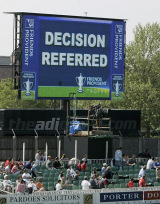MCC committee supports umpire referrals
The MCC World Cricket Committee has called for an extension of the player referral system used in the Friends Provident Trophy during the English season into Test cricket with more use to be made of the technology available
|
|

|